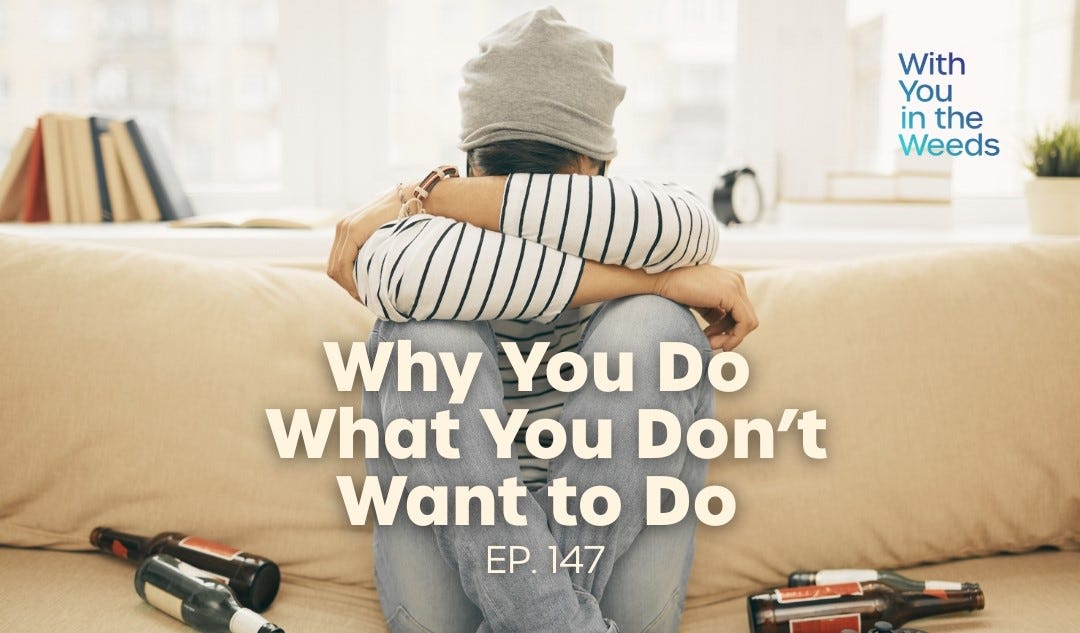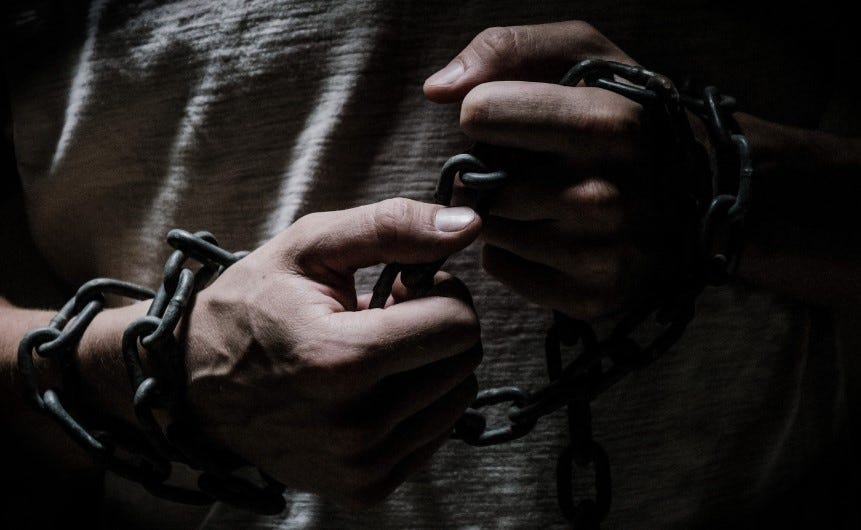Why You Do What You Don't Want to Do
Breaking the chains that bind you
Do you find yourself chasing the thing that chains you down? Maybe the dopamine rush from drinking, shopping, binge eating, or mindless scrolling leaves you feeling emptier than before. But you seem helpless to make a different choice.
The title of this episode captures the heart of the human dilemma for every person, not just someone caught in the throes of addiction. We all have an idea of what we’re supposed to do, and sometimes we actually do it. But then other times we all get in our own way and don’t deliver. In fact, we often do the exact opposite of what we know we should do.
Hosts Austin and Shay kick off the second episode of our new series, Dealing with Your Addictions, by peering through a biblical lens at the age-old struggle of why you do what you don’t want to do. Drawing from Romans 1, they frame addiction not just as a clinical trap but as a misguided quest for fulfillment apart from God, where good gifts like money or sex twist into controlling idols that promise salvation but deliver bondage.
You’ll hear their thoughts on:
A biblical perspective of addiction
The answer to the question, “Why do you do what you don’t want to do?”
The practical implications of a biblical view of addiction
Helpful ways to apply the Bible’s wisdom to your own life
As you listen, you’ll come to understand the spectrum of addictions and the reason your heart seeks comfort in worldly pursuits. But there’s also profound hope: No matter your past or number of relapses, in Christ you're cleansed, sanctified, and justified. God's love for you remains steadfast, unshaken by your harmful habits.
When you take the first step of radical honesty and bring your hidden struggles into the light, you’ll learn that God’s love is greater than your addiction and doesn’t change your identity in Christ as a beloved child of God.
Highlights of Shay & Austin’s Conversation
Addiction Through a Biblical Lens
Addiction is a reality that touches every life. Either we struggle with it personally or we know someone who does. In the previous episode, John and Lynn introduced the “six A’s of addiction” and laid out a helpful clinical definition:
Addiction is a persistent, compulsive behavior that worsens over time despite mounting negative consequences.
This definition sets the stage for understanding both the seriousness of addictive behaviors and the Bible’s explanation for our sinful inclinations.
We’re using Scripture as the foundational lens to approach addiction. While clinical and psychological perspectives are valuable, the Bible gives the ultimate framework because God, who created all things, knows the depths of the human heart. As you may have experienced, the causes of addiction can be quite complex, but there is hope of freedom and transformation.
The Spectrum of Addiction
Not all addictions are the same in their consequences, but they share common roots. On one end, there are ‘little a’ addictions, such as overspending or excessive gaming. These habits may not destroy your life immediately, but they still undermine relationships, productivity, and spiritual health. On the other end are ‘capital A’ addictions—alcohol, drugs, or sexual sin—which can devastate you, your family, and even your community.
Proverbs paints the picture of a person enslaved to addiction as a city without walls, defenseless and without resistance. But addiction is not simply a black-and-white issue; it exists on a spectrum. A high-functioning alcoholic may not see themselves as having a problem, while someone else faces daily destruction from the same struggle. Wherever someone falls on the addiction spectrum, one thing is always true: addiction reflects the search for happiness apart from God.
Wherever someone falls on the addiction spectrum, one thing is always true: addiction reflects the search for happiness apart from God.
Idolatry and the Human Heart
Romans 1 describes humanity’s universal condition. Paul explains that when people turn away from glorifying and thanking God, they inevitably worship something else. In this sense, addiction is a form of idolatry. Good things such as money or sex can become ultimate things, controlling you and shaping your identity. Idols whisper the lie: “If you have me, you are somebody.” In that way, addictions become “functional saviors”, promising life but delivering bondage.
Paul warns that humanity exchanged the truth of God for a lie, worshiping created things instead of the Creator. The result is slavery to sin. Whether through substance abuse, greed, or relational brokenness, every addiction is an attempt to find life apart from God—and every attempt leaves you emptier than before.
The Role of Pain and Trauma
Addiction often begins as a way to cope with pain. Past abuse, neglect, or trauma can make you vulnerable to seeking comfort in destructive behaviors. Alcohol, drugs, or pornography may feel like a warm hug—offering euphoric temporary relief but eventually enslaving you in a cycle of dependence.
What starts as a solution to pain becomes a source of deeper problems, which then fuels more addictive behavior. In other words, addiction often seems the solution to a problem, but it turns out to be the problem that needs a solution.
Modern awareness of trauma helps us understand the effects of the past. If you feel hurt by someone, it’s very possible that your wounds are real. But you still bear responsibility for the decisions you make. Romans 1 makes it clear that you are accountable to God for your actions. Addiction is not simply about bad choices or trauma alone but about how your broken heart tries to find healing apart from God.
Enslavement Versus Control
Many people who struggle with addiction believe they are still in control. Mark Twain once quipped, “Of course I can quit smoking—I’ve done it a thousand times.” This illustrates the deception of addiction. Think about someone driving down the highway with a steering wheel that is no longer connected. The person thinks they are steering, but the addiction is driving them.
The impact of this loss of control varies in scope. A one-time gambling loss may sting, but habitual gambling can wipe out retirement accounts, destroy marriages, and bankrupt families. Addiction always escalates, consuming more and more until it dominates your life.
The Hope of the Gospel
Amid this bleak picture, the Bible offers hope. In 1 Corinthians 6, Paul reminds believers in Corinth—a city immersed in sexual sin, drunkenness, and greed—that the gospel has power to change lives. He lists sins that once defined them, including idolatry, adultery, and drunkenness. Then he proclaims: “That is what some of you were. But you were washed, you were sanctified, you were justified in the name of the Lord Jesus Christ and by the Spirit of our God.”
Three truths shine through in this passage:
You are cleansed—through Jesus, your guilt and shame are forgiven.
You are sanctified—set apart for God, given a new identity and purpose.
You are justified—declared righteous before God, no longer defined by the past.
As Steve Cuss writes, “Sin doesn’t change God’s view of us—it changes our view of God’s view of us”. The shame of failure convinces you that God must be disgusted or done with you, but Scripture says otherwise. God sees you as a beloved son or daughter, bought at a price, secure in his love.
The Ongoing Struggle
For some, deliverance from addiction is immediate. Testimonies abound of people who, upon coming to Christ, were freed from alcoholism or pornography overnight. For many others, however, the struggle continues throughout life. This tension is captured in Romans 7, where Paul confesses his own battle: he delights in God’s law but feels the power of sin waging war within him. “What a wretched man I am! Who will rescue me from this body of death? Thanks be to God, who delivers me through Jesus Christ our Lord.”
Paul’s honesty shows that struggling with sin is not a sign of unbelief but part of the Christian journey. The key is not denial but confession—bringing the struggle into the light where Christ can work. When you admit your weakness and need, you take the first step toward freedom.
The Role of Community and Compassion
Addiction thrives in secrecy, but healing begins in community. This is why programs like Alcoholics Anonymous emphasize two truths: the need for God and the need for other people. Sadly, many addicts have found more acceptance in AA than in the church. It’s possible that you’ve felt judged and shamed at church, making you apprehensive about being vulnerable.
What would change if churches acknowledged that in some sense, we are all addicts? Christians could offer compassion rather than looking down on someone else who struggles more than they do. And you would feel safe sharing about your deepest needs, longings, and weaknesses.
Keep in mind that when we say compassion, we don’t mean to enable destructive behavior; we mean seeking the good of others while also protecting yourself. For example, a spouse caught in addiction may need to leave home to seek treatment. Grace and boundaries are not opposites.
Living in Hope and Honesty
We have some important takeaways for you in light of these helpful truths. First, remember who you are in Christ—cleansed, sanctified, and justified. Second, remember who others are in Christ, treating them with dignity and grace. Third, keep in mind that addiction is not inevitable; the gospel carries real power to transform your life. And last, progress begins with honesty: asking what pain or desire fuels your search for escape and deciding to bring that truth before God and share it with others.
Jesus’ invitation remains open: “Come to me, all you who are weary and heavy laden, and I will give you rest.” Whether struggling personally or walking alongside someone caught in addiction, the call is the same—turn to Christ, embrace community, and take steps toward healing. The fight is real, but so is the hope.






